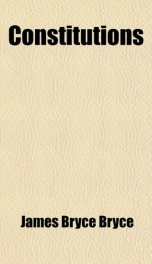constitutions

Purchase of this book includes free trial access to www.million-books.com where you can read more than a million books for free. This is an OCR edition with typos. Excerpt from book: the Judiciary from the other two powers has been less complete than in England, and the deference to what Englishmen and Americans call the Rule of Law less profound. The control over governmental action which the right of interpretation implies seems to the Swiss too great, and too political in its nature, to be fit for a legal tribunal. It is therefore vested in the National Assembly, which when a question is raised as to the constitutionality of a Federal Statute or Executive Act, or as to the transgression of the Federal Constitution by a Cantonal Statute, is recognized as the authority competent to decide. The same doctrine seems to prevail in the German Empire, though the point is there not quite free from doubt, and also in the Austrian Monarchy, in France, and in Belgium. In the Orange Free State, living under Roman-Dutch law, the Bench, basing itself on American precedents, claimed the right of authoritative interpretation, but the Legislature hesitated to admit it. American lawyers conceive that the strength and value of a Rigid Constitution are greatly reduced when the Legislature becomes the judge of its own powers, entitled after passing a statute which really transgresses the Constitution to declare that the Constitution has in fact not been transgressed. The Swiss, however, deem the disadvantages of the American method still more serious, for they hold that it gives the last word to the judges, persons not chosen for or fitted for such a function, and they declare that in point of fact public opinion and the traditions of their government prevent the power vested in their National Assembly from being abused. And it must be added that the Americans have so far felt the difficulty which the Swiss dwell on, that the Supreme Court has refused to pronounce upon the ac...
Info about the book
Author:
Series:
Unknown
ISBN:
1178805107
Rating:
4/5 (4)Your rating:
0/5
Languge:
English
Users who have this book
Users who want this book
What readers are saying
What do you think? Write your own comment on this book!
write a commentif you like constitutions try:
Other books by this author
Do you want to exchange books? It’s EASY!
Get registered and find other users who want to give their favourite books to good hands!


